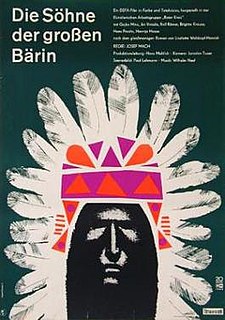 W
WAbrek Zaur is a 1926 Soviet silent Red Western directed by Boris Mikhin.
 W
WArmed and Dangerous is a 1977 Soviet western film. Based on the novel Gabriel Conroy and stories of Bret Harte.
 W
WAt Home among Strangers is a 1974 Soviet film starring Yuri Bogatyryov and Anatoly Solonitsyn and directed by Nikita Mikhalkov. Produced mainly in colour, some scenes are shot in black and white.
 W
WBlood Brothers is a 1975 East German western film directed by Werner W. Wallroth and starring Dean Reed, Gojko Mitic and Gisela Freudenberg.
 W
WThe Bodyguard is a 1979 Soviet action film released by Tadjikfilm. It is one of the best known of the Red Westerns and directed by the veteran feature and documentary maker, Ali Khamraev.
 W
WThe Crown of the Russian Empire, or Once Again the Elusive Avengers is a 1971 Soviet action movie, a second sequel of The Elusive Avengers, directed by Edmond Keosayan and made on Mosfilm.
 W
WThe Elusive Avengers is a 1967 Soviet adventure film directed by Edmond Keosayan and made by Mosfilm. It is loosely based on the novel Red Devilets by Pavel Blyakhin, already filmed in 1923 under its original name. The film is an example of Ostern, set in Russian Civil War era Ukraine.
 W
WThe Headless Horseman is a 1972 Soviet-Cuban Western film directed by Vladimir Vajnshtok based on the eponymous novel by Thomas Mayne Reid. The film was the first Soviet Western. It was a box office success, 51,7 million tickets were sold and the picture holds the 33rd place in terms of cinema attendance in the Soviet Union.
 W
WLemonade Joe, or the Horse Opera is a 1964 Czechoslovak musical comedy film, directed by Oldřich Lipský and written by Jiří Brdečka, based on his novel and stage play.
 W
WA Man from the Boulevard des Capucines is a Red Western comedy film of 1987, with nods to silent film and the transforming power of celluloid.
 W
WMiles of Fire/The Burning Miles is an early Red Western filmed by Samson Samsonov in 1957. Often considered the earliest of the 'Red Westerns', it was made before the term was coined. The film is a Russian civil war drama, focusing on the conflict between the Reds and the Whites.
 W
WThe New Adventures of the Elusive Avengers is a 1968 Soviet action film, a sequel of The Elusive Avengers, directed by Edmond Keosayan and made on Mosfilm. The film was followed by The Crown of the Russian Empire, or Once Again the Elusive Avengers released in 1971.
 W
WThe Sixth is a 1981 Soviet action film directed by Samvel Gasparov at Gorky Film Studio.
 W
WThe Sons of Great Bear is a 1966 East German Western film, directed by the Czechoslovak filmmaker Josef Mach and starring the Yugoslav actor Gojko Mitić in the leading role of Tokei-ihto. The script was adapted from the eponymous series of novels by author Liselotte Welskopf-Henrich, and the music composed by Wilhelm Neef. The picture is a revisionist Western, pioneering the genre of the Ostern, and emphasises the positive portrayal of Native Americans, while presenting the Whites as antagonists. It is one of the most successful pictures produced by the DEFA film studio.
 W
WStrictly Business is a 1962 Soviet black-and-white comedy film directed by Leonid Gaidai, based on three short stories by O. Henry: "The Roads We Take", "Makes the Whole World Kin", and "The Ransom of Red Chief".
 W
WTecumseh is a 1972 East German western film directed by Hans Kratzert and starring Gojko Mitić, Annekathrin Bürger and Rolf Römer. The film depicts the life of the Native American leader Tecumseh (1768–1813), including his role in Tecumseh's War and his later death in the War of 1812 while fighting with the British against the United States.
 W
WUlzana is a 1974 western film directed by Gottfried Kolditz and starring Gojko Mitic as Ulzana, Renate Blume and Rolf Hoppe. It is a Red Western, made as a co-production between East Germany, Romania and the Soviet Union.
 W
WWhite Sun of the Desert is a 1970 'Eastern' or Ostern film of the Soviet Union.